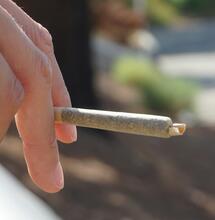How to Avoid Cannabis Dependency?

Not keeping a stash at home and avoiding going places where weed is easy to be found can help when you fear risky behavior and trying to address a cannabis dependency problem.
People smoke weed for various reasons: relaxation, de-stress, habit, social and family situations, and in some cases it’s because of dependence. If you think that reaching out too often for marijuana is becoming an issue in your life, the reasonable thing to do is cut back on use and re-evaluate if this is something you wish to continue with.
There Are Specific Actions You Can Take to Avoid Cannabis Dependency
Your end goal might be switching to occasional use or quitting completely. The starting point is deciding what you want to achieve. And then there are a number of things you can do once acknowledging that your cannabis habits are overwhelming. If you feel the need to better think this through, you can write down a list of reasons why you want to stop or slow down on smoking. You can also make a list of reasons why you want to continue using cannabis, how and when it is of benefit. Then weight in the two lists.
Here’s what else you can do:
- Stop buying (or growing), and smoke only socially every once in a while, during weekends or during holiday breaks.
- Admit if you have a problem because of cannabis use (e.g., you frequently postpone tasks, it affects your job performance, you can’t find a job because of it, etc.)
- Identify goals (e.g., you are not going to keep cannabis at home, therefore you won’t have quick access to it).
- Dispose of any paraphernalia for smoking cannabis. Not seeing stuff like your pipe or bong can help reduce cravings.
- Don’t go places or hang out with people that might trigger your cannabis use. If you find yourself in the same circle, directly say you skip the turn and leave the party.
- Discuss your decision to abstain or quit with a close friend. Can they also offer support when you have a hard time dealing with cravings?
- Make changes to your lifestyle. Don’t do the things you used to do while high. Make space for new things. It’s a good idea to have a calendar with activities that could fill in the time you were usually spending high.
- Buy yourself a small gift with the money you would have spent on weed. A book, a t-shirt, a new pair of pants or anything that will remind you: A-ha, I bought this because I saved money not buying weed again.
Hopefully, this gives you some guidance, ideas and confidence boost that you can do it. If you are dealing with a more complicated situation where you find it extremely difficult to quit on weed, try out a special program (some of them are online, and free) that will guide you each day for a month as you abstain and detox. You can always look for professional help as well.
How to Manage Cravings While Pausing or Cutting Back on Cannabis?
It is the biggest challenge when trying to reduce cannabis or gravitate away from old habits that make you depend on it. It is normal to experience cravings. They would come and go, usually around the time of the day you were most likely to indulge, but remember that they are short-lived moments. It helps to remove yourself from the context that ‘enables’ your cravings. Like taking a walk just to change the setting, or counting to ten and taking deep breaths. It can limit your temptation before the moment wins you over.
Breathing exercises
Take a deep breath and hold the air in your lungs for a few seconds. Count to five before you breathe out slowly through the mouth. It will make the instant urge to pass. It also helps if you feel frustrated, worried or have racing thoughts. Certain breathing exercises are beneficial for cleansing the lungs in smokers.
Snacks instead of joints
There might be the need to put something in your mouth just to combat the moment where you yearn for a rouch between the lips waiting to be lit up. Joints can be substituted with CBD gummies, or you can go entirely cannabis-free with other snacks or non-alcoholic beverages.
Keep an active schedule
A mind that is not entertained will quickly start thinking about how to fight the boredom. Weed is often about fun times. But if you are taking a break from weed, you might need to fill up your days with new activities. Opting for healthy meals that demand time to prepare, spending an hour at the gym, reading at least 50 pages of a book every evening, are the kind of activities that can let in a gust of new energy in your day in and day out.
No need for panic
Weed is not an enemy, but it is best when not abused. As you embark on your personal journey to cut back on use, abstain or quit to avoid dependency, you may find new ways on how to use cannabis more mindfully when you are up for it again. It can be a learning process where you discover something new about your habits and yourself.
Also read on Soft Secrets:














